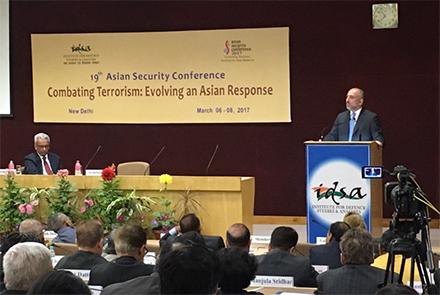Despite international investment in counter-terrorism, terrorist organizations are growing their capabilities and presence in Afghanistan and Pakistan, says Haneef Atmar the National Security Advisor for President Ghani.
Addressing a gathering at the 19th Asian Security Conference in Delhi on Monday, Atmar said: "We share the region with Pakistan, which has the highest concentration of terrorists anywhere. Despite international investment in counter-terrorism, terrorism is growing its capabilities and presence in the region. We hope that Pakistan will never allow them sanctuary.”
Atmar says terrorists have “access to sanctuaries, financing, recruitment, training and other support enablers, through semiotic relations with some state elements and criminal economic networks, which have enabled the four groups of terror networks not only to survive counter-terrorism operations, but to grow their lethal capacities.”
He estimates the number of the fighters terrorist groups have deployed in Afghanistan at between 40,000 to 45,000 of whom roughly one in four is foreign. This includes global and Pakistani jihadists.
He also pointed out that Pakistan’s operation of Zarb e Azb and the increased pressures on Daesh and Al-Qaeda in the Middle East have led their displacement to and the concentration of these groups in the Afghanistan and Pakistan region.
“Despite their common desire to destroy the Afghan state with the objective to establish safe havens in Afghanistan, these groups pursue individual goals against other nations,” he told the participants.
He believes that the Al-Qaeda and Daesh are also threats to India, China, Russia, Iran and other Central Asia countries.
“Also, while most of the Pakistan-based networks threaten security of other nations, the TTP and its splinter groups are waging violence in Pakistan itself,” Atmar said, referring to recent attacks in Pakistan.
Atmar said Afghanistan has paid the high cost of the “terror” and added that “despite this high cost, we have held our ground defending Afghanistan and the region.”
He also issued a warning to the regional and World: “The most serious danger to the regional and world security, comes from the continued breakdown of regional consensuses over terrorism as result of disputes, rivalries and incompatible interests elsewhere.”
He said consensus was needed three areas:
· There is no distinction between good and bad terrorists
· The centrality of the state-to-state relations and cooperation in counter terrorism; and
· The need for security for all countries against terrorism.
“We have seen selective distinction between good and bad terrorists these days and a new trend among some regional actors to work with the Afghan Taliban against apparently Deash,” Atmar said.
“That is a wrong policy that will certainly backfire,” he warned.
“The Taliban still continues to kill Afghans. All other terrorists, including their enemies, are able to operate from Afghanistan and Pakistan region because of Taliban and state tolerance of sanctuaries,” he said.
On peace talks, he said that Afghanistan has urged all regional countries to engage the Taliban to bring about peace and not for purposes of war.
He called for a shared strategy against the terrorists and said that “a common strategy against a common enemy is the only way to save our nations, our region and the world community against terrorism.”
Such a strategy should include:
· Common understanding – Given the growing evidence, the starting point should be a shared understanding of our common enemy
· Some highlights –The purpose is to highlight some key dimensions and principles of the common strategy
· Generational challenge - There is an emerging consensus that it is likely to be a generational challenge for the next two decades
· Four-level action – A coordinated strategy of diplomatic, security and development actions at four levels, global, Islamic, regional and national levels
· Ending sponsorship and tolerance – the number-one priority of the strategy should be ending sponsorship of terrorism by persuasion or cohesive actions against states and individuals
· Coordinated responses – Coordinated intelligence, military and diplomatic responses to remove sanctuaries, recruitment, training, equipping and financing infrastructure
· National actions – To address the governance, poverty and educational challenges
· Regional support for counter terrorism - Support for the U.S, NATO and Afghan operations
· Peace and Reconciliation – Afghan peace and reconciliation based on the Afghan constitution and renunciation of violence and ties with foreign terrorist is key to broader counter terrorism, proposes Atmar.
The Indian Defence Minister Manohar Parrikar said at the conference that India and Afghanistan have been victims of terrorism which is undoubtedly the single biggest threat to international peace and security.
Parrikar talked about the challenges that are being faced by the international community and their security because of terrorism.
"Terrorism remains a pervasive challenge to international security, developing coordinated global response is important. Terrorism is undoubtedly the single biggest threat to international peace and security,” he said.
"Afghanistan and India have been victims of proxy wars for decades now,” said Parrikar.

